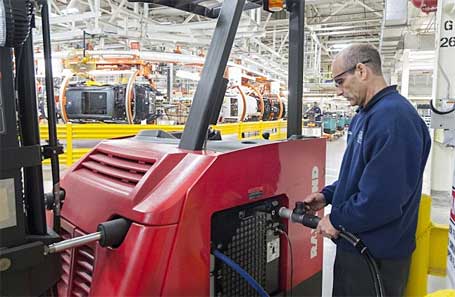
Anybody who has read this blog for a while knows that I like talking about hydrogen fuel cell forklifts and other hydrogen-powered materials handling units. At a time when hydrogen cars have not been fully commercialized, the H2 fuel cell material handling units have been fully commercialized.
And taking the bull by the horns and aggressively buying and using these units is BMW Manufacturing in Spartanburg, SC. Back in 2010, BMW manufacturing had about 100 hydrogen fuel cell material handling units, but now that number is up to 230 units for their 4 million square foot facility.
The material handling units have also helped save a great deal in electricity, up from 1.8 million kw/hours per year in 2010 to 4.1 million kw/hours per year. In addition, the expansion at BMW Manufacturing means that their hydrogen dispensers will be able to output up to 400 kg of hydrogen per day.
But, BMW isn’t content with the progress so far. According to the Environmental Protection Agency (EPA) BMW Manufacturing uses about 38.4-percent green power at their facility. This makes them number 2 according to the EPA on their list of top 20 on-site generation in the Green Power Partnership program (number 1 is Wal-Mart).
According to the EPA, “BMW Manufacturing earned a 2003 Green Power Leadership Award for using landfill gas to generate a portion of the power needed to operate its Spartanburg, South Carolina manufacturing facility. Landfill gas is piped from a landfill to the manufacturing facility to power its four gas turbines, which generate approximately 10 MW of electricity for the factory, and also to supply hot water for cooling, heating, and hot water needs.”
But, wait, there’s more. BMW Manufacturing is using some of this landfill in a Landfill Gas to Hydrogen Project. According to BMW Blog, “BMW also released a project update to the Landfill Gas-to-Hydrogen Pilot Project. The first phase of the study, that validated the economic and technical feasibility, began in July 2011. The project has now successfully moved to the second phase of methane-to-hydrogen conversion. The project team, led by South Carolina Research Authority (SCRA), is implementing and testing equipment that will monitor the hydrogen purity. To do this, BMW has installed a clean-up system that takes a stream of landfill gas (post-siloxane removal), removes the sulfur and trace contaminants and, ultimately, produces hydrogen via a Steam Methane Reformer (SMR).”
So, there you have it. In addition to employing the hydrogen fuel cell forklifts and other material handling units, BMW Manufacturing is also trying to source hydrogen fuel as cleanly and renewably as possible. This is the kind of forward thinking of which more manufacturers should take notice.